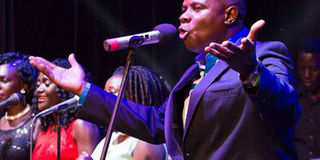35 years later, Diplock’s Soka Omunonye still kicks the gown

Diplock Ssegawa on stage
What you need to know:
- With sax ace Happy Kyazze on the saxophone, Jay Bugoma on the drums, Aloysius Migadde on lead guitar, Fredrick Kiguule on percussion and Ronnie Nsereko and Kaggwa Seninde on keys among other, they created a sound twice heavier but highly engaging.
- Nantayiro is both deaf and mute, and Ssegawa is proud that she has grown to become a successful banker that loves music even when she can’t hear a sound. He says she’s like a symbol of never giving up.
It is not known if Diplock Ssegawa had given up on vigorous performing before 2013. During a light moment at the National Theatre, one comedian dramatised a story of the singer, apparently, after returning to Kampala after staying in London, during a wedding Ssegawa was attending, they played his song Sooka Omunonye to get the bride searching for the groom and boom, he discovered he was still a star.
The artiste himself has however never confirmed the comical story, though as he goes on with his daily work at his office that has for years been stationed at the theatre, it is clear music is one thing he has not only lived with for life but one that still influences him.
Born Diplock Ssegawa Katumba, he is from a musical family of Aida and Benjamin Katumba, a primary school teacher, chorister and music director in the different Anglican churches he served.
“We used to put up small performances every Sunday and my dad was also good at helping us understand the different chords and music symbols,” he reminiscences in an earlier interview.
In fact, he says at times their father would start a song as he left the bedroom and by the time he was at the dinning, it would be complete with vocals by members of the household.
But Ssegawa has been overly mistaken, being inspired and at times sharing a stage with Jimmy Katumba (who he was not related to) and of course having the same last name, the young audience consuming his music today doesn’t even know the face behind the song that makes brides kick the gown viciously while searching for the groom at weddings.
Since, they both have a tenor deep voice, fans at times confuse Sooka Omunonye to have been done by Katumba who passed on in 2006.
In fact, even the website hipipo.com, the organisers of the Hipipo annual music awards credit the song as one that was done by Katumba rather than Ssegawa.
Thus promoting a show that took place at the National Theatre on 30 January, dubbed Sooka Omunonye at 35, for many millennials was equivalent to bringing an artiste back from the dead.
In fact, even when some of them mysterious showed up at the auditorium, they kept wondering why they never knew the face behind those songs like Bansanyusa Nnyo Abavubuka, Typical African Music or Beera Nange among others.
Many of these songs were played with a nostalgic feel to it, part of the younger audience was getting surprised as the older ones were relieving the moments thanks to the stories that Ssegawa and team had carefully curated to be told between performances.
He shared a story of how one Maria Nakyagabba, then one of the vocalist suggested they sing Sooka Omunonye at the part the bride looks for the groom during the reception.
Since then, the song has gone on to dominate both weddings and introduction ceremonies - surprisingly though, Ssegawa says the inspiration behind the song was never romantic.
“It was an incident where I was really lost in someone’s garden,” he says adding that when it started getting dark, he got out of the car; “I was thinking, I need to look for him, as I brushed through his banana plantation, the tune started ringing…Sooka Omunonye…” he says.
The song that towers over four minutes was re-recorded four times and the famous version is mostly made brilliant by a simple band piece of a pianist, guitarist, bass, drummer, keys and what sounds like trumpet distortions once in a while.
While playing it at its 35 anniversary though, Ssegawa did things differently, with an excited young band half of which seemed younger than the music they played, the team created a rhythm that didn’t only respect but paid homage to what is old but as well introduce new things.
With sax ace Happy Kyazze on the saxophone, Jay Bugoma on the drums, Aloysius Migadde on lead guitar, Fredrick Kiguule on percussion and Ronnie Nsereko and Kaggwa Seninde on keys among other, they created a sound twice heavier but highly engaging.
Many of them being university graduates of music, it wasnot surprising that they were playing to impress their former teachers like Margaret Najukyi, who happened to teach Kyazze and is coincidentally a former singer with Ssegawa.
Married to Norah Katumba, Ssegawa’s family members were well represented including his daughters Julie Nantabba who has since broke onto the cinema scene portraying Vicky on NTV’s Second Chance as well as his oldest Flavia Nantayiro who he says inspires him a lot.
Nantayiro is both deaf and mute, and Ssegawa is proud that she has grown to become a successful banker that loves music even when she can’t hear a sound. He says she’s like a symbol of never giving up.




